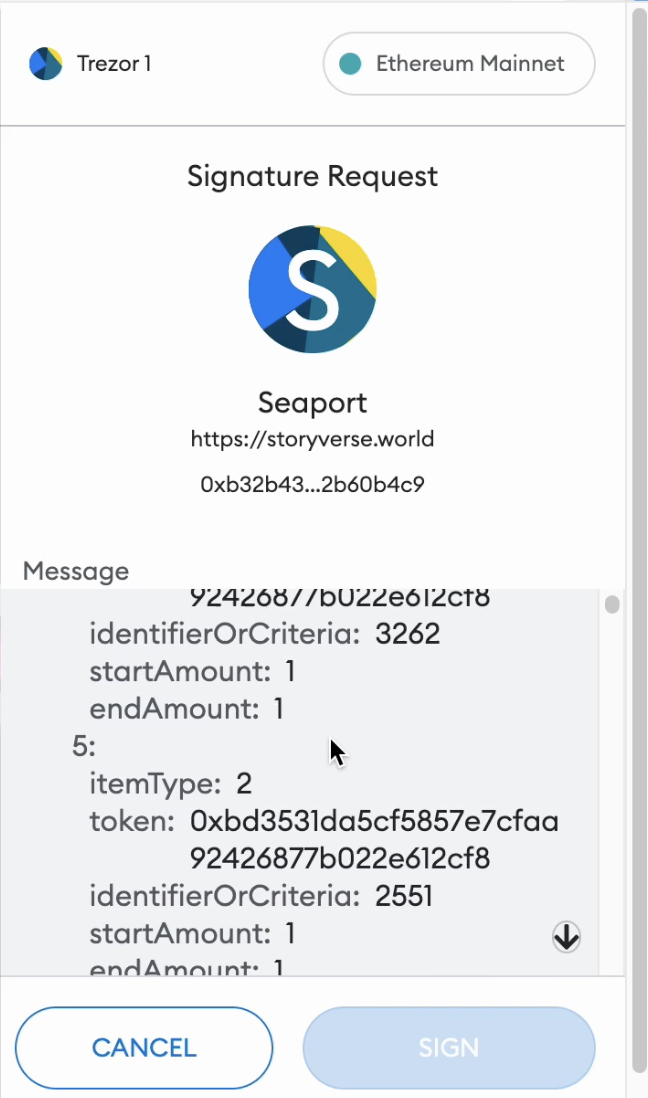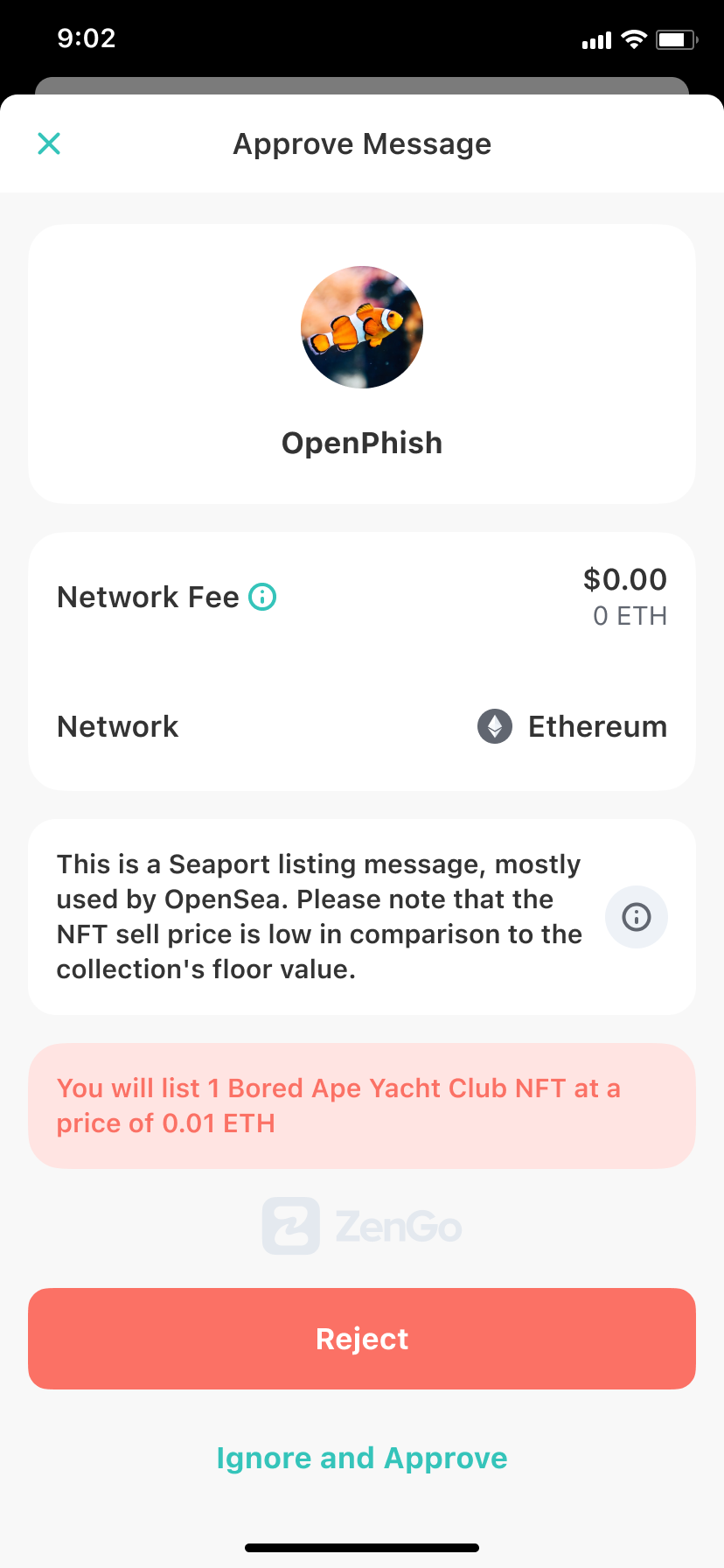Human-readable offline signatures
The ERC-6384 proposal outlines a specification for Sign-In with Ethereum, which allows users to authenticate themselves using their Ethereum accounts and ENS names for usernames. The proposal emphasizes the need for a human-friendly interface that is free of machine-targeted artifacts, and for adequate mitigation of security risks such as MITM attacks and malicious signing requests. The proposal also recommends the use of ERC-191 for signed data standard, rather than EIP-712, and includes guidelines for supporting internationalization. The proposal is open, non-proprietary, and has long-term viability, with no dependence on a centralized server except for those already being run by the application that the user is signing in to. The proposal also includes an added functionality to the contract with the "view" modifier, which cannot change the on-chain state and harm the existing functionalities of the contract. Wallet implementers are allowed to construct a custom Sign-In with Ethereum user interface by parsing the ABNF terms into data elements for use in the interface, while still adhering to the display rules outlined in the proposal. Overall, the ERC-6384 proposal aims to provide a simple, secure, and extensible solution for Sign-In with Ethereum that is easy for users to understand and implement.
Video
Original
Abstract
This EIP introduces the evalEIP712Buffer function, which takes an EIP-712 buffer and returns a human-readable text description.
Motivation
The use case of Web3 off-chain signatures intended to be used within on-chain transaction is gaining traction and being used in multiple leading protocols (e.g. OpenSea) and standards EIP-2612, mainly as it offers a fee-less experience. Attackers are known to actively and successfully abuse such off-chain signatures, leveraging the fact that users are blindly signing off-chain messages, since they are not humanly readable. While EIP-712 originally declared in its title that being ”humanly readable” is one of its goals, it did not live up to its promise eventually and EIP-712 messages are not understandable by an average user.
In one example, victims browse a malicious phishing website. It requests the victim to sign a message that will put their NFT token for sale on OpenSea platform, virtually for free.
The user interface for some popular wallet implementations is not conveying the actual meaning of signing such transactions.
In this proposal we offer a secure and scalable method to bring true human readability to EIP-712 messages by leveraging their bound smart contracts. As a result, once implemented this EIP wallets can upgrade their user experience from current state:

to a much clearer user experience:

The proposed solution solves the readability issues by allowing the wallet to query the verifyingContract. The incentives for keeping the EIP-712 message description as accurate as possible are aligned, as the responsibility for the description is now owned by the contract, that:
- Knows the message meaning exactly (and probably can reuse the code that handles this message when received on chain)
- Natively incentivized to provide the best explanation to prevent a possible fraud
- Not involving a third party that needs to be trusted
- Maintains the fee-less customer experience as the added function is in “view” mode and does not require an on-chain execution and fees.
- Maintains Web3’s composability property
Specification
The key words “MUST”, “MUST NOT”, “REQUIRED”, “SHALL”, “SHALL NOT”, “SHOULD”, “SHOULD NOT”, “RECOMMENDED”, “MAY”, and “OPTIONAL” in this document are to be interpreted as described in RFC 2119.
EIP-712 already formally binds an off-chain signature to a contract, with the verifyingContract parameter. We suggest adding a “view” function ("stateMutability":"view") to such contracts, that returns a human readable description of the meaning of this specific off-chain buffer.
/** * @dev Returns the expected result of the offchain message. */ function evalEIP712Buffer(bytes32 domainHash, string memory primaryType, bytes memory typedDataBuffer) external view returns (string[] memory) { ... }
Every compliant contract MUST implement this function.
Using this function, wallets can submit the proposed off-chain signature to the contract and present the results to the user, allowing them to enjoy an “on-chain simulation equivalent” experience to their off-chain message.
This function will have a well known name and signature, such that there is no need for updates in the EIP-712 structure.
Function's inputs
The inputs of the function:
domainHashis the EIP-712's domainSeparator, a hashedeip712Domainstruct.primaryTypeis the EIP-712'sprimaryType.typedDataBufferis an ABI encoded message part of the EIP-712 full message.
Function's output(s)
The output of the function is an array of strings. The wallet SHOULD display them to its end-users. The wallet MAY choose to augment the returned strings with additional data. (e.g. resolve contract addresses to their name)
The strings SHOULD NOT be formatted (e.g. should not contain HTML code) and wallets SHOULD treat this string as an untrusted input and handle its rendering as such.
Support for EIP-712 messages that are not meant to be used on-chain
If verifyingContract is not included in the EIP-712 domain separator, wallets MUST NOT retrieve a human-readable description using this EIP. In this case, wallets SHOULD fallback to their original EIP-712 display.
Rationale
- We chose to implement the
typeDataBufferparameter as abi encoded as it is a generic way to pass the data to the contract. The alternative was to pass thetypedDatastruct, which is not generic as it requires the contract to specify the message data. - We chose to return an array of strings and not a single string as there are potential cases where the message is composed of multiple parts. For example, in the case of a multiple assets transfers in the same
typedDataBuffer, the contract is advised to describe each transfer in a separate string to allow the wallet to display each transfer separately.
Alternative solutions
Third party services:
Currently, the best choice for users is to rely on some 3rd party solutions that get the proposed message as input and explain its intended meaning to the user. This approach is:
- Not scalable: 3rd party provider needs to learn all such proprietary messages
- Not necessarily correct: the explanation is based on 3rd party interpretation of the original message author
- Introduces an unnecessary dependency of a third party which may have some operational, security, and privacy implications.
Domain name binding
Alternatively, wallets can bind domain name to a signature. i.e. only accept EIP-712 message if it comes from a web2 domain that its name as defined by EIP-712 is included in eip712Domain. However this approach has the following disadvantages:
- It breaks Web3’s composability, as now other dapps cannot interact with such messages
- Does not protect against bad messages coming from the specified web2 domain, e.g. when web2 domain is hacked
- Some current connector, such as WalletConnect do not allow wallets to verify the web2 domain authenticity
Backwards Compatibility
For non-supporting contracts the wallets will default to showing whatever they are showing today. Non-supporting wallets will not call this function and will default to showing whatever they are showing today.
Reference Implementation
A reference implementation can be found here. This toy example shows how an EIP-20 contract supporting this EIP implements an EIP-712 support for "transferWithSig" functionality (a non-standard variation on Permit, as the point of this EIP is to allow readability to non-standard EIP-712 buffers). To illustrate the usability of this EIP to some real world use case, a helper function for the actual OpenSea's SeaPort EIP-712 is implemented too in here.
Security Considerations
The threat model:
The attack is facilitated by a rogue web2 interface (“dapp”) that provides bad parameters for an EIP-712 formatted message that is intended to be consumed by a legitimate contract. Therefore, the message is controlled by attackers and cannot be trusted, however the contract is controlled by a legitimate party and can be trusted.
The attacker intends to use that signed EIP-712 message on-chain later on, with a transaction crafted by the attackers. If the subsequent on-chain transaction was to be sent by the victim, then a regular transaction simulation would have sufficed.
The case of a rogue contract is irrelevant, as such a rogue contract can already facilitate the attack regardless of the existence of the EIP-712 formatted message.
Having said that, a rogue contract may try to abuse this functionality in order to send some maliciously crafted string in order to exploit vulnerabilities in wallet rendering of the string. Therefore wallets should treat this string as an untrusted input and handle its renderring it as such.
Analysis of the proposed solution
The explanation is controlled by the relevant contract which is controlled by a legitimate party. The attacker must specify the relevant contract address, as otherwise it will not be accepted by it. Therefore, the attacker cannot create false explanations using this method. Please note that if the explanation was part of the message to sign it would have been under the control of the attacker and hence irrelevant for security purposes.
Since the added functionality to the contract has the “view” modifier, it cannot change the on-chain state and harm the existing functionalities of the contract.
Copyright
Copyright and related rights waived via CC0.
Adopted by projects
Not miss a beat of EIPs' update?
Subscribe EIPs Fun to receive the latest updates of EIPs Good for Buidlers to follow up.
View all